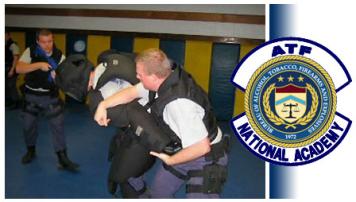
Basic special agent training for new hires consists of a two-part training program. The first part is the Criminal Investigators Training Program (CITP) delivered by the Federal Law Enforcement Training Center (FLETC), Department of Homeland Security, Glynco, Georgia. The CITP provides fundamental training in the techniques, concepts and methodologies of conducting criminal investigations. Some of the subjects covered in the training include training in firearms, physical techniques, driving techniques, handcuffing, interviewing, surveillance, crime scene management, photography, basic firearms training and federal court procedures.
The CITP lasts approximately 12 weeks. Each class consists of 48 students, of whom approximately half are ATF trainees. The remaining portion of the CITP class consists of students from other federal agencies.
The CITP requirement may be waived for new hires who have attended the CITP with another federal agency. Successful completion of CITP is mandatory to maintain employment.
The second part of training is the Special Agent Basic Training (SABT). SABT for special agent trainees is a demanding and intensive training program that covers a wide range of disciplines including firearms and ammunition identification; firearms trafficking; report writing, interviewing techniques; alcohol/tobacco diversion investigations; explosives and fire/arson investigations; firearms and tactical training, close quarter countermeasures; field operations, undercover techniques; and physical conditioning. The SABT consists of approximately 15 weeks of training with a class of 24 student trainees.
The SABT is designed to meet all the foundational requirements of a newly hired ATF special agent trainee. Successful completion of SABT is mandatory to maintain employment.
During training at the ATF National Academy, special agent trainees will be required to learn and subsequently adhere to, the Special Agent General Orders. These orders set the foundation for a safe and successful career as an ATF special agent.
Special Agent Basic Training
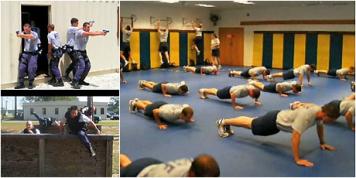
Special Agent Basic Training (SABT) for special agent trainees is a demanding and intensive training program that covers a wide range of disciplines including:
- Firearms and ammunition identification
- Firearms trafficking
- Report writing
- Interviewing techniques
- Alcohol/tobacco diversion investigations
- Explosives and fire/arson investigations
- Firearms and tactical training
- Undercover operations
- Physical training
- Special Agent Basic Training is designed to meet all the basic skills and requirements of newly hired ATF special agent trainees. Successful completion of SABT is mandatory in order to maintain employment.
Firearms Training
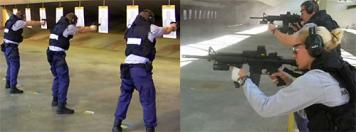
The primary objective of firearms training is to familiarize newly hired ATF special agents in the safe and effective use of Bureau issued weapon systems including handguns, long guns and shotguns.
Newly hired special agents receive approximately 100 hours of firearms training during Special Agent Basic Training (SABT) in the areas of marksmanship, tactical and judgment shooting. Trainees receive instruction in the areas of Tactical Marksmanship, Concealed Carry, Tactical Marksmanship On The Move, Flying Armed and Low Light Tactical Shooting.
Trainees will be required to score a minimum of 80percent on the ATF Practical Pistol Course with their issued Bureau handgun in two consecutive qualifications.
Arson & Explosives Training
Arson and explosives training gives newly hired special agent trainees a basic foundation of knowledge relating to arson/fire and explosive investigations. Trainees will learn to identify the criminal misuse of explosives and fire.
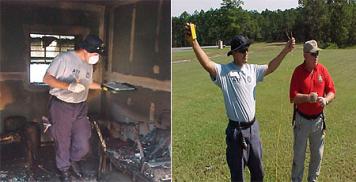
Trainees receive training in the areas of:
- Fire scene investigations
- Multiple live burn scenarios
- Gathering and preserving fire scene evidence
- Interviewing witnesses
- Developing financial motives
- Identification of commercial explosives
- Improvised explosive devices
- The effects of explosives
- Processing bomb scenes
- Collecting and examining post blast evidence
- Hands-on explosives training and handling
Tactical Training
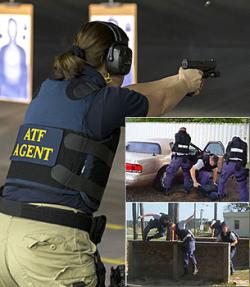
Special agent trainees, throughout the Special Agent Basic Training (SABT) curriculum, progress through a wide variety of demanding tactical judgment training. Areas of training include:
- Tactical team entries encountering both lethal and non-lethal targets, using proper judgment and demonstrating use of proper force and the appropriate level of control while encountering suspects
- Felony vehicle assaults/extractions
- Proper tactics in breaching a structure
As part of the tactical training, special agent trainees will be required to successfully complete the Final Tactical Practical administered at the end of tactics training. The Final Tactical Practical is a rigorous timed exercise consisting of:
- An obstacle course with trainees having to scale a 6-foot cinder block wall and chain link fence
- A half mile run in full tactical gear
- A shoot/no-shoot exercise
- Proper application of required use of force Close Quarter Countermeasures (CQC) techniques on encountered role players
- A simulated agent extraction by dragging a 100-pound dummy 25 yards
Physical Training
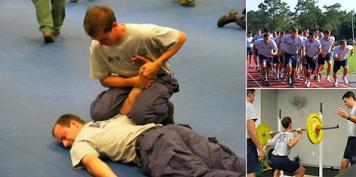
Physical conditioning and close quarter countermeasures (CQC) are an integral part of the Special Agent Basic Training (SABT) program. Newly hired special agent trainees will participate in approximately 56 hours of physical training (28 2-hour sessions) and 72 hours of CQC
The physical training sessions will include weight training, running long distances and sprints, repeated calisthenics (push-ups, sit-ups, pull-ups) and various obstacle courses. Trainees will be tested three times during SABT on physical fitness using the Federal Law Enforcement Training Center (FLETC) Physical Efficiency Battery (PEB). Trainees are required to achieve a minimum score of 25 percent in the three critical areas of the FLETC PEB. The critical areas are:
- 1.5 -Mile Run
- Agility Run
- Bench Press
Due to the highly demanding and intense physical training curriculum, newly hired trainees MUST arrive for training in excellent physical condition.
Close Quarter Countermeasures (CQC) training includes:
- Ground avoidance and ground escape
- Proper arrest and handcuffing techniques
- Proper defensive pressure points
Academics
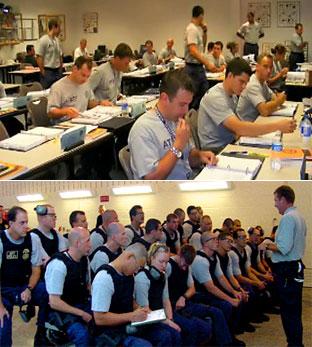
Newly hired special agent trainees will receive extensive classroom training in such areas as legal issues including Fourth Amendment, Constitutional Law, Federal Criminal Law and the Gun Control Act.
Trainees will be required to pass seven academic exams with a minimum score of 80 percent in the following areas:
- Firearms Technology
- Report Writing/Interviewing/Property/ Alcohol & Tobacco Diversion
- Firearms Trafficking/Firearms Regulations
- Arson/Arson Regulations
- Explosives/Explosive Regulations
- Field Operations/Undercover Regulations
- Legal Issues


